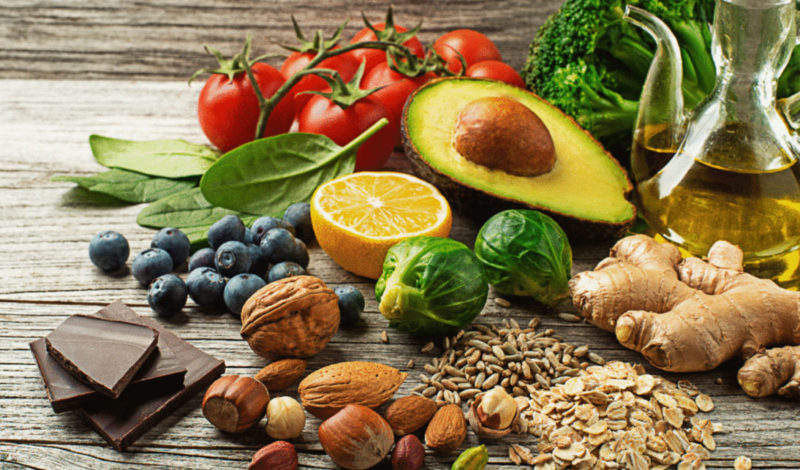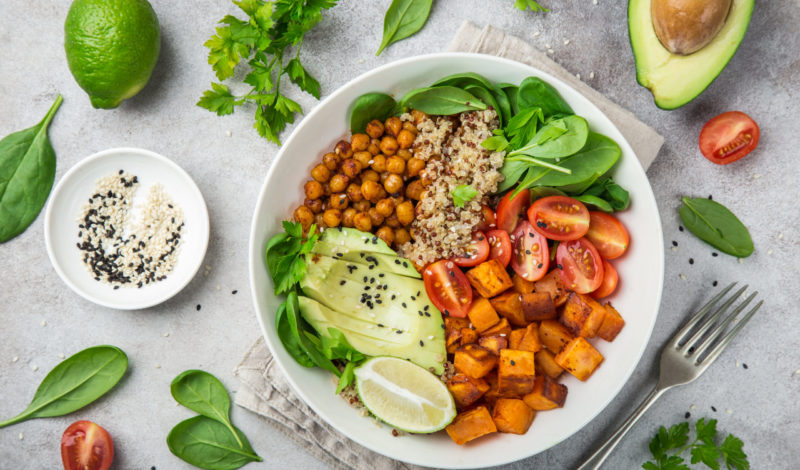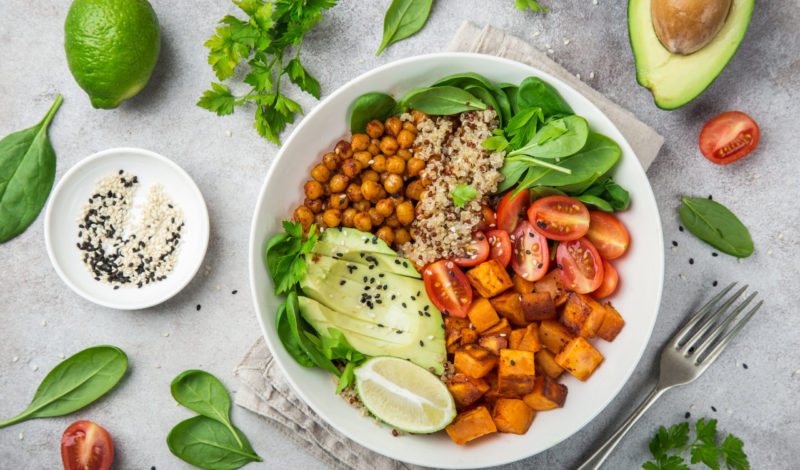When you eat vegan food, you avoid all animal foods such as meat, fish, eggs or dairy products. But they [...]

From now on vegan – conversion made easy
A purely vegan diet means, especially for beginners, […] a great challenge.
eople always choose to live vegan. The transition to the complete renunciation of animal food is not easy for many. A purely vegan diet means a great challenge, especially for beginners who have never dealt with the subject before. Which foods are vegan? Which food covers my nutritional needs? What are the health consequences of a pure plant-based diet? These and many other questions will come to your mind. Our information and tips will make it easier for you to make the change to vegan.
That’s why I eat vegan: reasons to change diet
First of all: It is advisable to approach the change in diet slowly and not to stress yourself. Do not renounce animal products overnight. Your metabolism must get used to the new food first. Over time, however, your body will progressively assimilate the new eating habits.
Being a vegan means more than just following a trend. The easiest way to keep up your new resolve is to always keep your personal reasons in mind. This can be incredibly motivating. With a firm conviction you can also master difficult situations.
So keep reminding yourself why you’re doing this. The following reasons can speak for a vegan nutrition:
- You decide to do without animal food out of love for animals.
- Ecological aspects such as climate protection play a major role for you.
- The possible health benefits have convinced you.
First step: find out what your body really needs
It is important that you, as a future vegan, are intensively occupied with the topic of nutrition. In order to eat a healthy and balanced vegan diet, a little research is necessary before your change. Only then will you know which vital nutrients to look out for in the near future. Although vegetable food is rich in nutrients, it cannot cover all important vitamins, trace elements and minerals. Some are also only contained in small doses or are more difficult for the body to use. Among the critical nutrients and vital substances in a vegan diet are primarily vitamin B12, vitamin D, iron, iodine, zinc, calcium and omega-3 fatty acids.
Find out which nutrients are contained in which plant-based foods. This way you can create a varied diet and avoid possible deficiencies caused by vegan diets. It is advisable to have your blood values checked by your family doctor about one year after your diet change in order to rule out a nutrient deficit. If you decide to live as a vegan and change your diet permanently, you should have your blood checked by a doctor every one to two years.
Avoid initial digestive problems
A vegan diet means for beginners not only the sudden renunciation of foods that they had previously eaten with pleasure and regularly. The body, too, must first get used to the pure plant diet. Many freshly baked Veganer suffer at first frequently from flatulence, belly pain and full feeling. This has a simple reason: With a full vegan nutrition you take up clearly more fiber than with mixed food, because vegetable food such as oats or vegetables is rich in fiber.
In addition, your intestinal flora must first adapt to the new diet, because you now also feed the intestinal bacteria with new food. So don’t feed yourself vegan overnight to avoid digestive problems during the changeover. Rather, it is advisable to slowly get the body used to the purely plant-based diet. If problems arise, herbal teas and flea seed shells can also alleviate your symptoms. Besides, probiotic foods can also help. Pay attention to your intestines in any case. INTEST.pro from BIOMES tells you which bacteria it is colonized with and whether this is beneficial for you. Based on the results, you can also have an individual nutrition plan drawn up for you.
Vegan Nutrition for Beginners: Our 5 Tips
Make yourself aware why you want to abstain from animal food. If you are fully behind your beliefs, the vegan change will be easier.
Find out about the nutrients and vital substances your body needs every day and consider your knowledge in the composition of your diet. In this context, it is also advisable to look into the topic of dietary supplements..
If you are not really familiar with the vegan diet, get inspired. The number of vegan restaurants and cafés in Germany has increased considerably in recent years – especially in big cities.
Switching to a purely vegetable diet is easier if you don’t have to do without your favorite delicacies. Whether Bolognese, steak or cake – with oat cream, soy meat and egg replacer almost everything is possible. You can find suggestions in numerous books, magazines and on the Internet.
Make contact with other vegans and exchange experiences. Ideally, the exchange not only expands your knowledge, but also helps you to deal with possible resistance from your environment in a more relaxed way.



